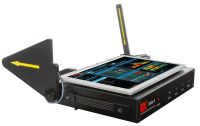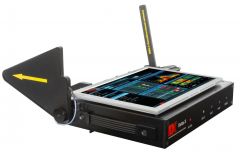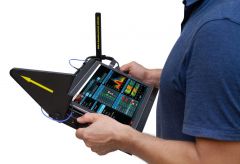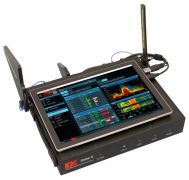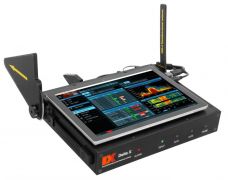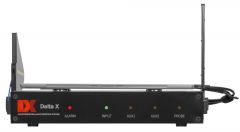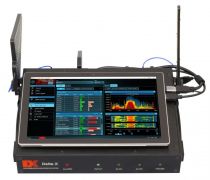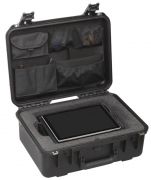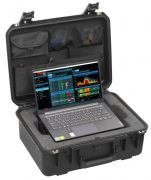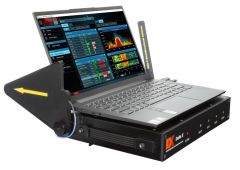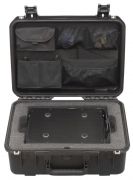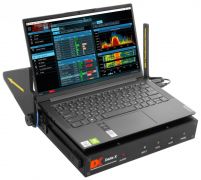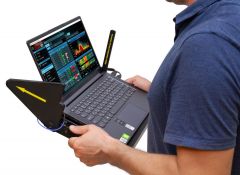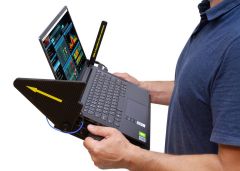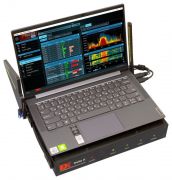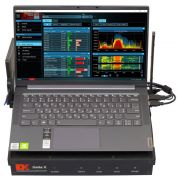DELTA X G2/12 - Countersurveillance Sweeping System
The second generation of the Delta X (G2) is designed in a new portable format, which significantly eases the search process. New models operates with a laptop, or tablet, with the help of magnetic holders. They hold the laptop/tablet reliably in all situations giving the operator the ability to move and tilt the system during sweeping. Using update rate of 3GHz-4GHz per second and frequency range 9 kHz – 12 GHz system can instantly detect digital signals with short bursts. System also has ability to detect and locate the transmitter simultaneously.
FEATURES
• Quickly and reliably detects all kinds of RF listening devices, including analog, digital, constantly existing and intermittent, sending audio or video, with or without encryption
• Finds hidden surveillance devices employing the digital standards GSM, 3G, 4G/LTE, 5G(<6GHz) Bluetooth, Wi-Fi, DECT, etc.
• Detects illegal information transmission in AC, telephone, Ethernet, alarm and other wires as well as in the infrared range with the help of the supplied Multifunction Probe
• Can work in instant detection mode, guarding mode, locating mode and car tracker detection
• Has a 20-50 times higher sensitivity and detection distance compared to conventional RF detectors and near-field receivers
• Real-time spectrum analysis gives the ability to detect short-burst signals such as Wi-Fi, Bluetooth or mobile devices within just a few seconds
• Automatic antenna selection provides high sensitivity and detection distance on all frequency bands
• Can monitor the RF environment 24 hours a day with data logging
• Capable of detecting covert bugging devices with an accumulation function and transmitters hidden within the spectrums of other signals
• Supports storage of an unlimited quantity of signals. Full information is stored in the log and can be reviewed during the detection, or at a later time. Multiple logs are supported.
• Demodulation of audio in FM, AM, USB, LSB, CW (adjustable BW 3…240 kHz)
• Alarm relay output can activate external devices when a dangerous signal is detected (turn on a CCTV system, for example)
• Powered from the laptop’s or tablet’s USB
• Quickly and reliably detects all kinds of RF listening devices, including analog, digital, constantly existing and intermittent, sending audio or video, with or without encryption
• Finds hidden surveillance devices employing the digital standards GSM, 3G, 4G/LTE, 5G(<6GHz) Bluetooth, Wi-Fi, DECT, etc.
• Detects illegal information transmission in AC, telephone, Ethernet, alarm and other wires as well as in the infrared range with the help of the supplied Multifunction Probe
• Can work in instant detection mode, guarding mode, locating mode and car tracker detection
• Has a 20-50 times higher sensitivity and detection distance compared to conventional RF detectors and near-field receivers
• Real-time spectrum analysis gives the ability to detect short-burst signals such as Wi-Fi, Bluetooth or mobile devices within just a few seconds
• Automatic antenna selection provides high sensitivity and detection distance on all frequency bands
• Can monitor the RF environment 24 hours a day with data logging
• Capable of detecting covert bugging devices with an accumulation function and transmitters hidden within the spectrums of other signals
• Supports storage of an unlimited quantity of signals. Full information is stored in the log and can be reviewed during the detection, or at a later time. Multiple logs are supported.
• Demodulation of audio in FM, AM, USB, LSB, CW (adjustable BW 3…240 kHz)
• Alarm relay output can activate external devices when a dangerous signal is detected (turn on a CCTV system, for example)
• Powered from the laptop’s or tablet’s USB
FEATURES OF THE NEW GENERATION
• New portable design – the device is reliably mated with the laptop or tablet and moved during the detecting and locating process
• The laptop or tablet is attached with the help of the magnetic holders
• Side handles are used for carrying
• All antennas are fixed to the main unit
• Carrying case is in the supplied set
• New portable design – the device is reliably mated with the laptop or tablet and moved during the detecting and locating process
• The laptop or tablet is attached with the help of the magnetic holders
• Side handles are used for carrying
• All antennas are fixed to the main unit
• Carrying case is in the supplied set
ADVANTAGES
✦ What it is: a portable system controlled by a laptop computer or tablet
• The high capacity of a laptop’s hard drive enables full data logging during the detection (24/7 possible)
• Wider screen is more convenient for analysis
• Compatible with touch screens
• Magnetic holders provide reliable attachment of the laptop/tablet to the unit while the side handles make it easy to carry the entire system
✦ Handling of the mobile and wireless bands GSM, CDMA, 3G, 4G/LTE, 5G(<6GHz), DECT, Wi-Fi, Bluetooth, etc.
• Mobile and wireless signals are detected simultaneously with analog transmissions
• Mobile/wireless signals are detected with the use of individual thresholds and are displayed separately from other signals
• Activities within each band are stored as one signal with a certain danger level to avoid excessive records in the Signals table and to locate the sources with a hopping frequency
• Additional sweepings on the ‘short-burst’ bands are performed to increase the probability of interception of such signals as GSM, 3G, 4G, 5G(<6GHz), DECT, Wi-Fi, Bluetooth, etc.
• External interference from neighboring mobile phones and Wi-Fi routers can be rejected with the help of the thresholds
• The supplied data files allow the operator to adjust the system to the mobile/wireless bands employed in the country of use
✦ Sensitivity and detection distance
• The built-in spectrum analyzer has 20-50 times higher sensitivity and detection distance compared to conventional RF detectors and near-field receivers
• Resistant to interference – sensitivity remains high regardless of the proximity to wireless routers, cordless phones, mobile phones, TV towers, radio broadcasting and mobile communications
✦ Support of the ‘Known signals’ table
• The operator can easily distinguish between safe and dangerous signals
• The TV frequencies employed in the country of use can be quickly imported from the supplied data files
• The FM, VHF/UHF police and municipal channels can be collected and stored for further use
✦ Advanced signal recognition method
• The signals are automatically recognized in the spectrum traces and inserted or updated in the Signals table
• Both analogue and digital signals are captured with an assigning of a corresponding Danger level
✦ Unique algorithm of measuring the signal’s Danger level
• Uses a combination of the reference trace and individual thresholds for mobile/wireless bands
• Takes into consideration both the signal’s strength and bandwidth
• Works for both analogue and digital signals including transmissions with a changing frequency
• Is used during the locating procedure and provides more reliable results compared to the traditional ‘signal strength’ method
✦ Low demands on the operator’s level of knowledge
• The system can be prepared for detection with the help of the ‘Update Masks’ procedure within a few minutes
• Manual handing of spectrum traces is not necessary
• Everything is done automatically after the detection starts
• The operator is warned by an audio alarm when a dangerous signal is detected
✦ Data logging
• All the spectrum traces and alarms are logged during detection
• The situation at any given time can be reviewed and studied
• 24 hours a day logging provides detection of periodically working/remotely controlled bugging devices
✦ Tracking of the signal’s activity
• The full history of each separate signal, or of all signals simultaneously, is displayed on the Alarms graph
• The events at any given time can be reviewed by simply clicking on the graph
• The operator can see the duration of an activity and as such distinguish between any interference and real danger
✦ The Waterfall and Persistence graphs
• Both the present and previous measurements at any given time can be displayed
• The displayed time interval (density) is selectable in the range of 2 minutes to 6 hours
✦ Car Tracker Detector mode
• The monitoring of mobile bands can detect signals from GPS trackers hidden within a vehicle
• Mobile and wireless signals are detected simultaneously with analog transmissions
• Mobile/wireless signals are detected with the use of individual thresholds and are displayed separately from other signals
• Activities within each band are stored as one signal with a certain danger level to avoid excessive records in the Signals table and to locate the sources with a hopping frequency
• Additional sweepings on the ‘short-burst’ bands are performed to increase the probability of interception of such signals as GSM, 3G, 4G, 5G(<6GHz), DECT, Wi-Fi, Bluetooth, etc.
• External interference from neighboring mobile phones and Wi-Fi routers can be rejected with the help of the thresholds
• The supplied data files allow the operator to adjust the system to the mobile/wireless bands employed in the country of use
✦ Sensitivity and detection distance
• The built-in spectrum analyzer has 20-50 times higher sensitivity and detection distance compared to conventional RF detectors and near-field receivers
• Resistant to interference – sensitivity remains high regardless of the proximity to wireless routers, cordless phones, mobile phones, TV towers, radio broadcasting and mobile communications
✦ Support of the ‘Known signals’ table
• The operator can easily distinguish between safe and dangerous signals
• The TV frequencies employed in the country of use can be quickly imported from the supplied data files
• The FM, VHF/UHF police and municipal channels can be collected and stored for further use
✦ Advanced signal recognition method
• The signals are automatically recognized in the spectrum traces and inserted or updated in the Signals table
• Both analogue and digital signals are captured with an assigning of a corresponding Danger level
✦ Unique algorithm of measuring the signal’s Danger level
• Uses a combination of the reference trace and individual thresholds for mobile/wireless bands
• Takes into consideration both the signal’s strength and bandwidth
• Works for both analogue and digital signals including transmissions with a changing frequency
• Is used during the locating procedure and provides more reliable results compared to the traditional ‘signal strength’ method
✦ Low demands on the operator’s level of knowledge
• The system can be prepared for detection with the help of the ‘Update Masks’ procedure within a few minutes
• Manual handing of spectrum traces is not necessary
• Everything is done automatically after the detection starts
• The operator is warned by an audio alarm when a dangerous signal is detected
✦ Data logging
• All the spectrum traces and alarms are logged during detection
• The situation at any given time can be reviewed and studied
• 24 hours a day logging provides detection of periodically working/remotely controlled bugging devices
✦ Tracking of the signal’s activity
• The full history of each separate signal, or of all signals simultaneously, is displayed on the Alarms graph
• The events at any given time can be reviewed by simply clicking on the graph
• The operator can see the duration of an activity and as such distinguish between any interference and real danger
✦ The Waterfall and Persistence graphs
• Both the present and previous measurements at any given time can be displayed
• The displayed time interval (density) is selectable in the range of 2 minutes to 6 hours
✦ Car Tracker Detector mode
• The monitoring of mobile bands can detect signals from GPS trackers hidden within a vehicle
Functions of the software
• Rich visual representation: Spectrogram/Persistence, Waterfall, Alarms graph
• The Known Signals table allows the system to reject TV, FM and other "friendly" signals while maintaining high sensitivity to unknown signals.
• The Detector and Locator allow the operator to perform location of a bugging device with both visual and audio notification
• The Alarm Threshold decreases the false alarm rate
• The Hold Max Danger feature selects and shows the strongest signals for their location as the system is moved during detection
• The Update Mask procedure allows the operator to quickly adjust the system to the local RF environment in order to reject safe signals
• Sorting and filtering is supported in the Signals table
• The Report function allows the operator to export all obtained information about the desired signals
• Is easily localizable to any language
WORKING MODES
Stop / View Log
Review of the detection results stored in the log. The Signals table, Spectrogram, Waterfall and Alarms graph give full information about the detected signals and alarm
events
Update masks
Quick preparation for detection – the system automatically accumulates the broadcasting and other safe signals existing in the area in order to pass over them during the
subsequent detection
RF Sweep
The main detection mode. Provides maximum reaction time and the highest sensitivity. The operator can move the system or its antenna during the detection.
Guard 24/7
Rejection of short transmissions and usage of two antennas reduces false alarms in this mode. Suitable for 24 hour detection without unwanted false alarms.
Signal Analyzer
Checking of AC, Ethernet, Telephone and Alarm wires and the infrared/low frequency for the presence of unwanted bugging signals
Probe
Detection of vehicle mounted GPS trackers transmitting the coordinates via mobile networks
Car Tracker Detector
Analysis, demodulation and physical locating of detected signals
• Rich visual representation: Spectrogram/Persistence, Waterfall, Alarms graph
• The Known Signals table allows the system to reject TV, FM and other "friendly" signals while maintaining high sensitivity to unknown signals.
• The Detector and Locator allow the operator to perform location of a bugging device with both visual and audio notification
• The Alarm Threshold decreases the false alarm rate
• The Hold Max Danger feature selects and shows the strongest signals for their location as the system is moved during detection
• The Update Mask procedure allows the operator to quickly adjust the system to the local RF environment in order to reject safe signals
• Sorting and filtering is supported in the Signals table
• The Report function allows the operator to export all obtained information about the desired signals
• Is easily localizable to any language
WORKING MODES
Stop / View Log
Review of the detection results stored in the log. The Signals table, Spectrogram, Waterfall and Alarms graph give full information about the detected signals and alarm
events
Update masks
Quick preparation for detection – the system automatically accumulates the broadcasting and other safe signals existing in the area in order to pass over them during the
subsequent detection
RF Sweep
The main detection mode. Provides maximum reaction time and the highest sensitivity. The operator can move the system or its antenna during the detection.
Guard 24/7
Rejection of short transmissions and usage of two antennas reduces false alarms in this mode. Suitable for 24 hour detection without unwanted false alarms.
Signal Analyzer
Checking of AC, Ethernet, Telephone and Alarm wires and the infrared/low frequency for the presence of unwanted bugging signals
Probe
Detection of vehicle mounted GPS trackers transmitting the coordinates via mobile networks
Car Tracker Detector
Analysis, demodulation and physical locating of detected signals
SUPPLIED SET
• Main unit with the built-in spectrum analyzer and RF switcher - 1 pc
• Carry case - 1 pc
• Software Delta X on a USB drive - 1 pc
• ODA-4 – omnidirectional wideband antenna with screw and 20 cm cable - 1 pc
• MWA-6 – microwave antenna with screw and 20 cm cable - 1 pc
• Main unit with the built-in spectrum analyzer and RF switcher - 1 pc
• Carry case - 1 pc
• Software Delta X on a USB drive - 1 pc
• ODA-4 – omnidirectional wideband antenna with screw and 20 cm cable - 1 pc
• MWA-6 – microwave antenna with screw and 20 cm cable - 1 pc
• LPDA-12 – microwave antenna
• Multifunction Probe with cables (high-voltage cable, low-voltage cable, 2 m coaxial cable) - 1 pc
• In-line modular adapter - 1 pc
• Set of accessories (USB Type C to USB Type A adapter – 2, angle USB adapter – 2, magnetic stickers for laptop/tablet – 4) - 1 pc
• Multifunction Probe with cables (high-voltage cable, low-voltage cable, 2 m coaxial cable) - 1 pc
• In-line modular adapter - 1 pc
• Set of accessories (USB Type C to USB Type A adapter – 2, angle USB adapter – 2, magnetic stickers for laptop/tablet – 4) - 1 pc
| Specifications |
|
| Frequency range | 9 kHz – 12 GHz |
| Update rate | 3-4 GHz/sec |
| Reaction time (How quickly a dangerous signal is detected) | 3 — 4 sec |
| Format | Handheld unit |
| Antenna inputs | INPUT, AUX1, AUX2 |
| Probe input | PROBE |
| Occupied disk space per 24 hours | <24 Gb |
| Unit dimensions (without antennas) | 33.5x26x6 cm |
| Unit weight (without laptop/tablet) | 3.6 kg |
| Spectrum resolution | 9.8 kHz |
| Temperature Range | 0°C ... +55°C |
| Demands on laptop/tablet (not included in the supplied set) | Intel Core i3 / AMD Ryzen 3 or higher (Intel Core i5 / AMD Ryzen 5 recommended) 1 x USB 3.0/3.1/3.2 (or USB Type C) 1 x USB 2.0 (or USB Type C) RAM 8 Gb or more SSD 128 Gb or more Windows 7, 8, 10 or newer Screen 12-14″ |
| Displayed dynamic range | –90…–10 dBm |
| Displayed spectrum spans | 0,5, 1, 2, 5, 10, 25, 50, 100, 200, 500, 1000, 2000, 3000, 6000 MHz |
| Spectrum graphs | Spectrogram, Waterfall |
| Spectrogram’s displayed data | Persistence, Live, Max, Threshold |
| Detector’s modes | Wide-Range, Signal, Selection |
| Updated spectrum span | RF Sweep, Guard 24/7: broadband Signal Analyzer: displayed, selected, real-time Car Tracker Detector: mobile bands |
| Fields of ‘Signals’ table | Frequency, Bandwidth, Name, dbm Level, dbm Peak Level, Danger Level, Peak Danger Level |
| Fields of ‘Bands’ table | Begin, End, Name, Type, Threshold, Priority, Tracker detection |
| Fields of ‘Known Signals’ table | Frequency, BW, Name, Modulation |
pdf
pdf
pdf


